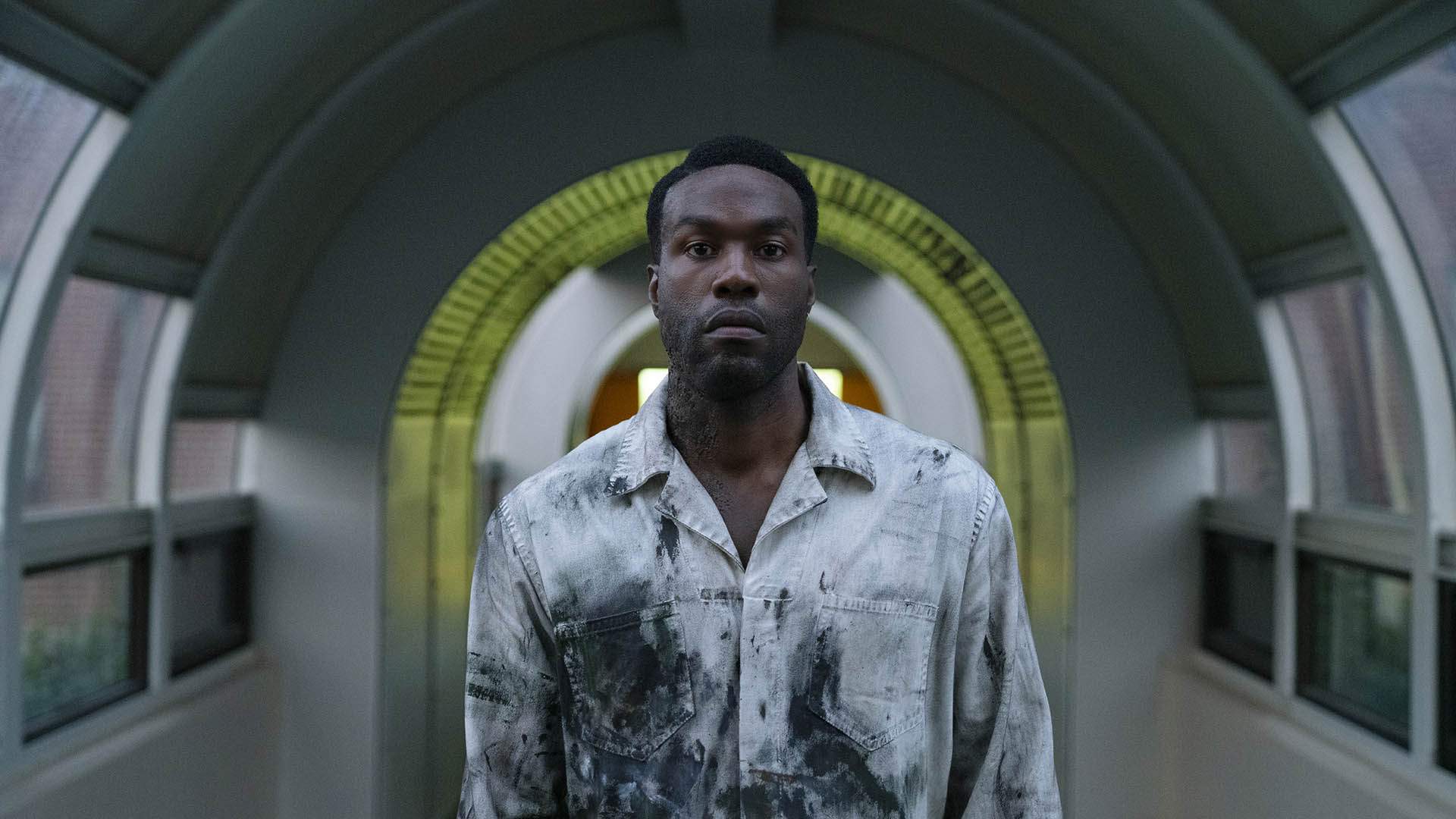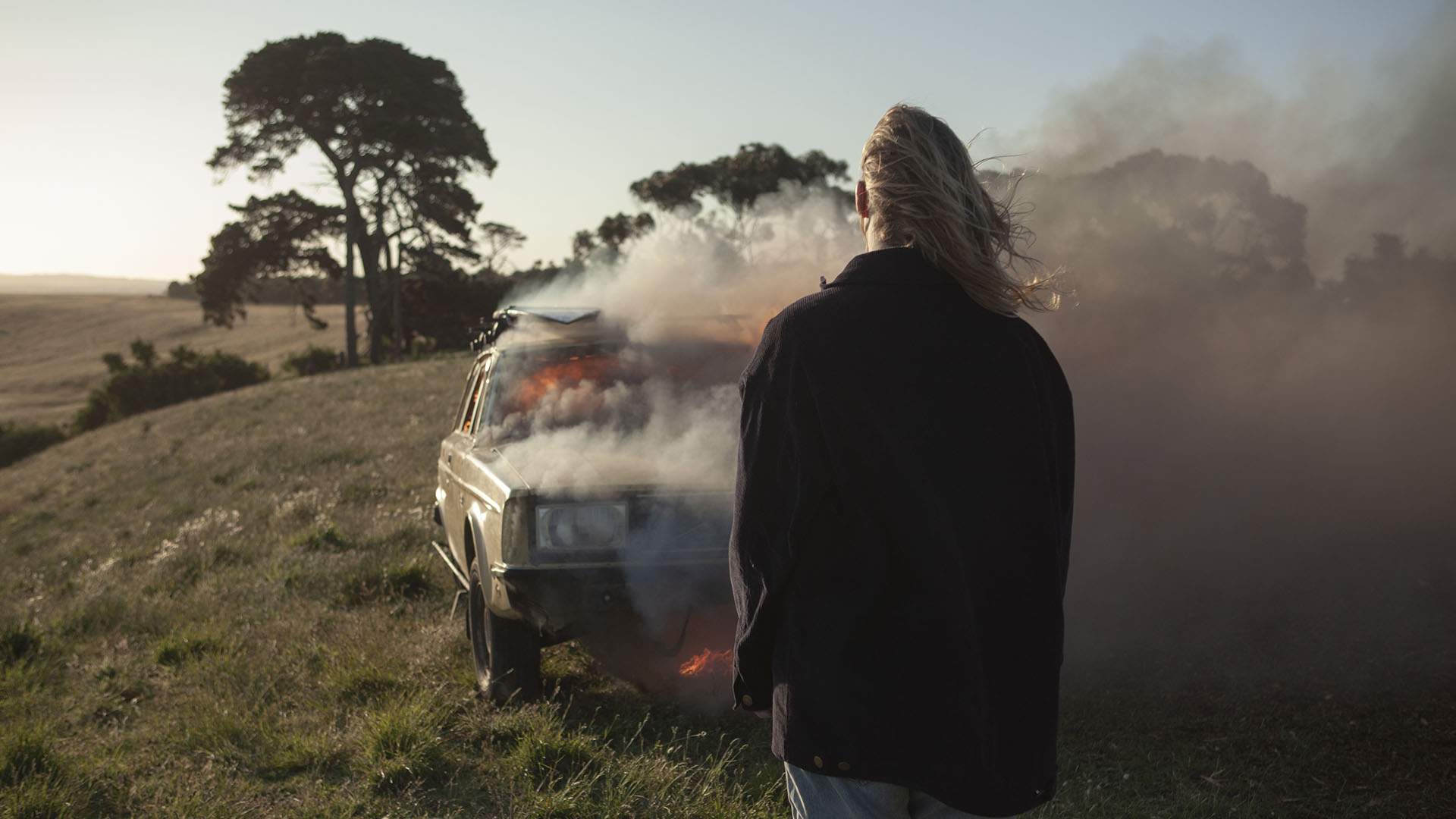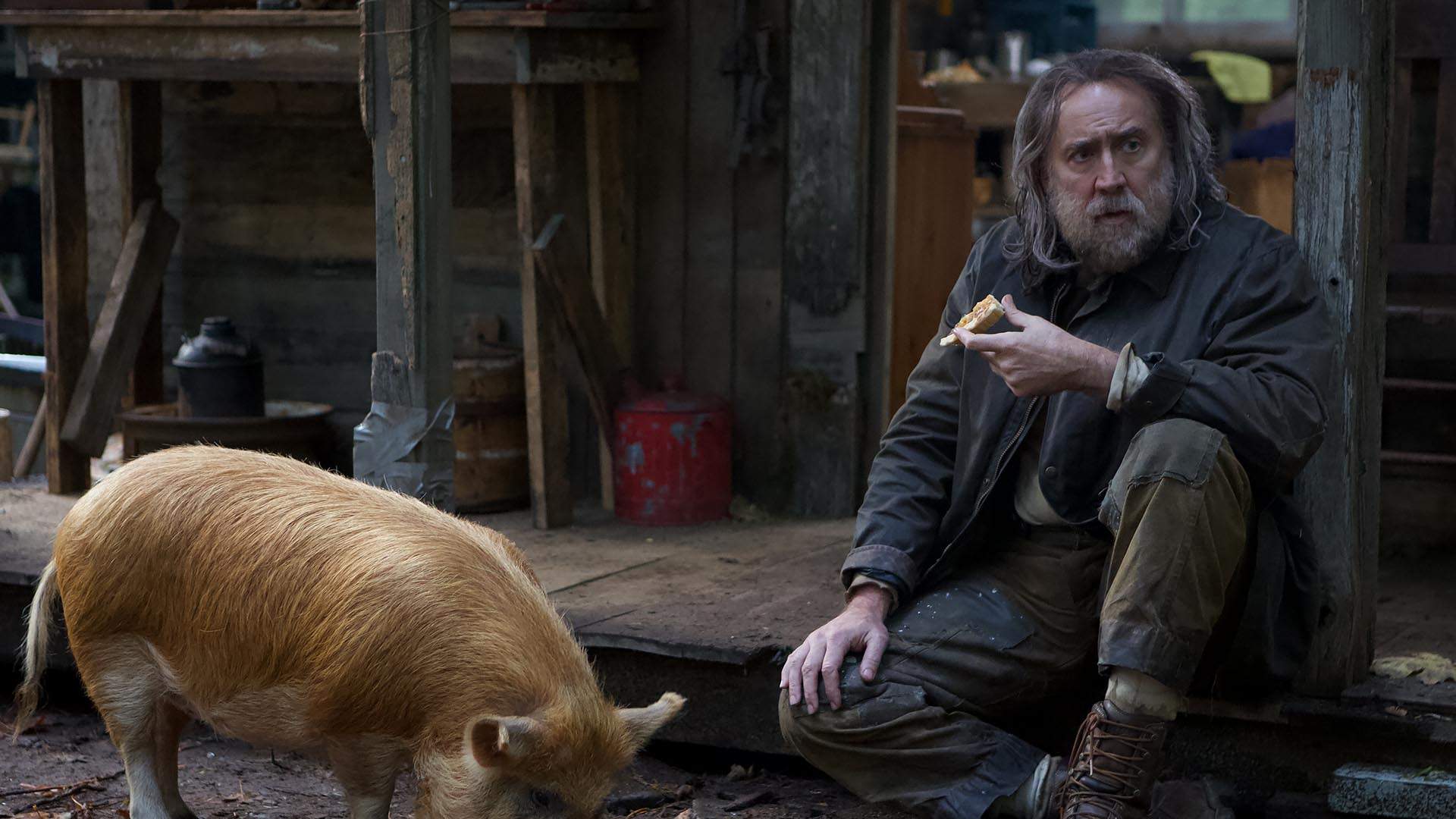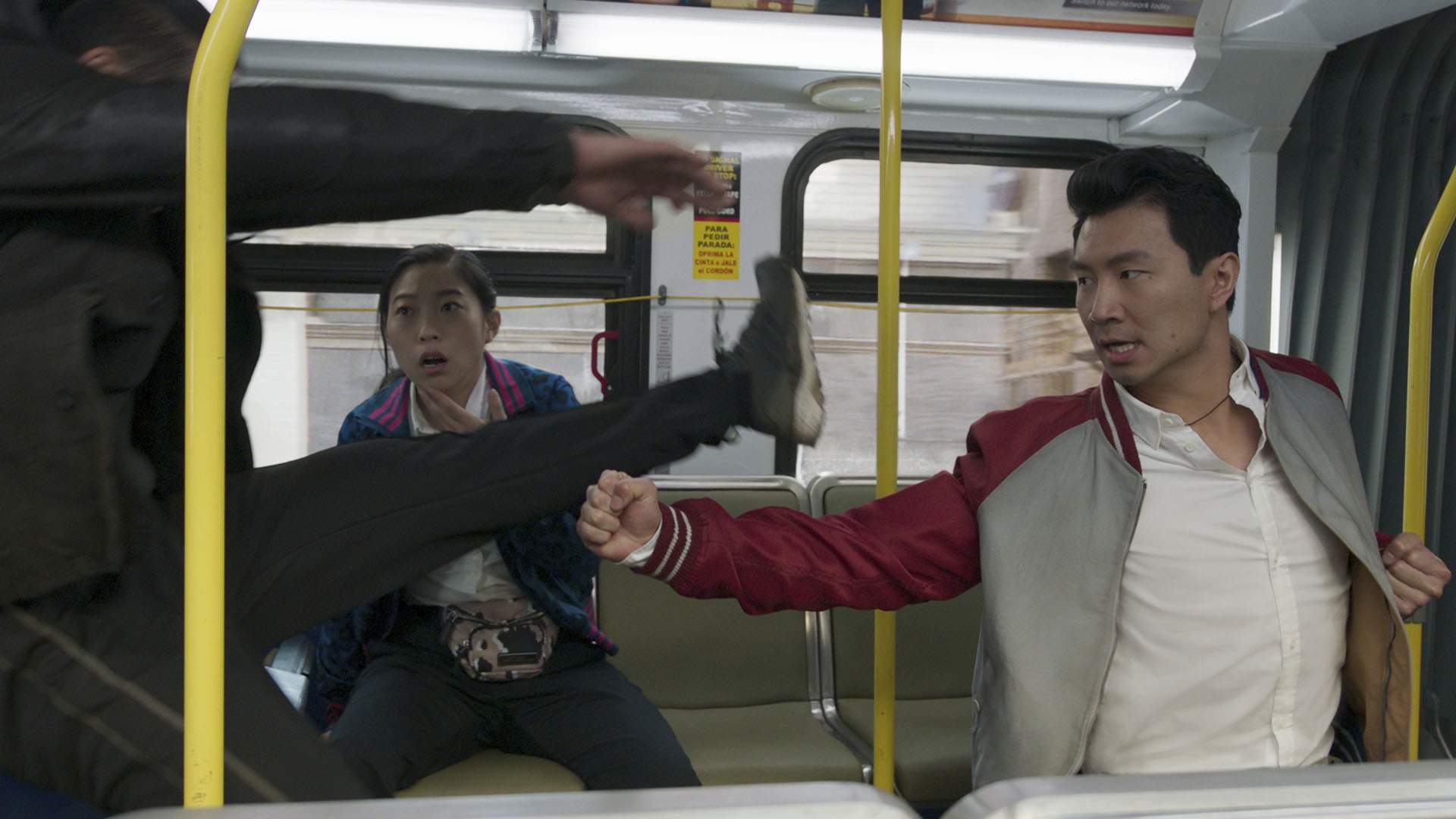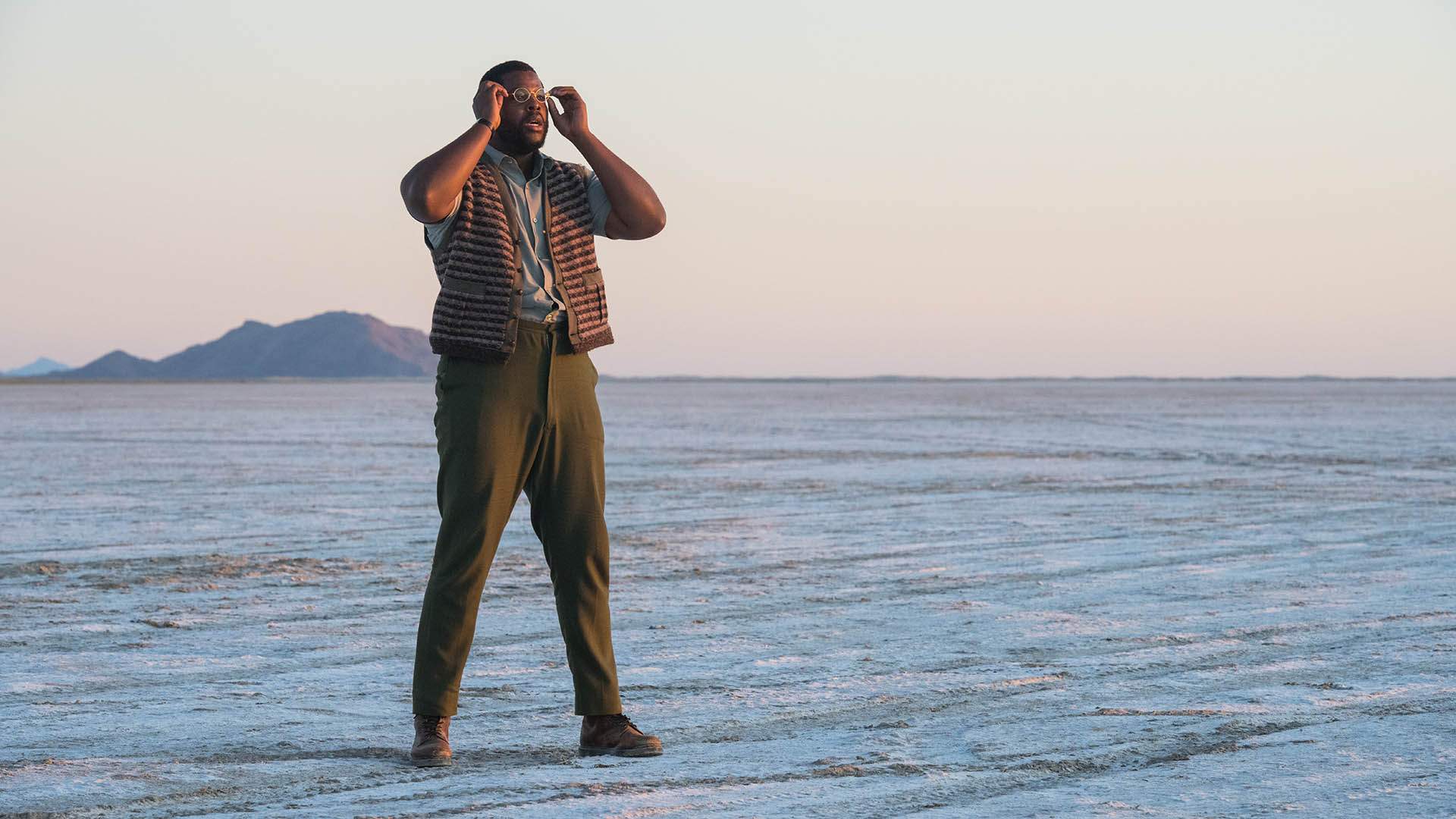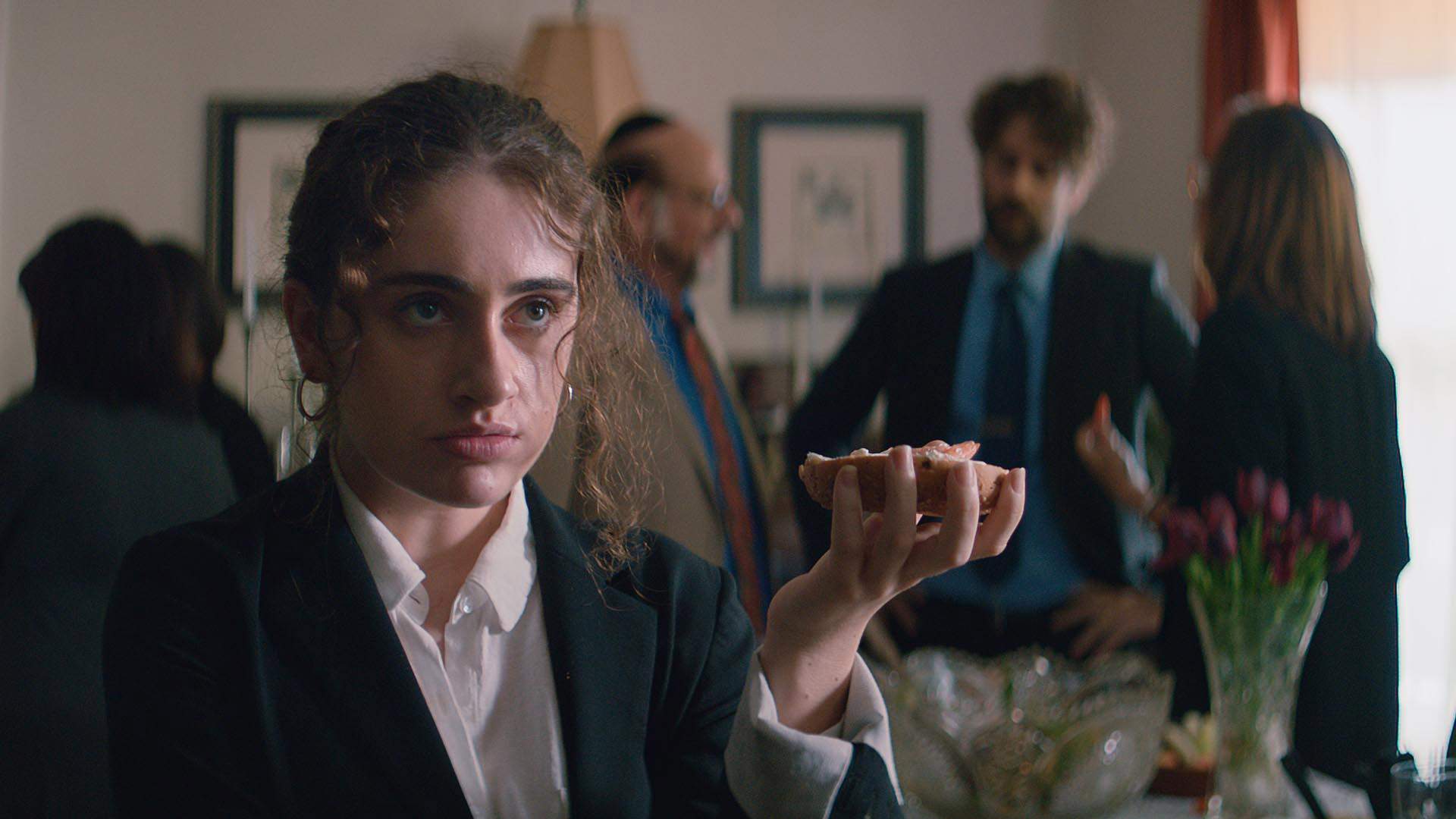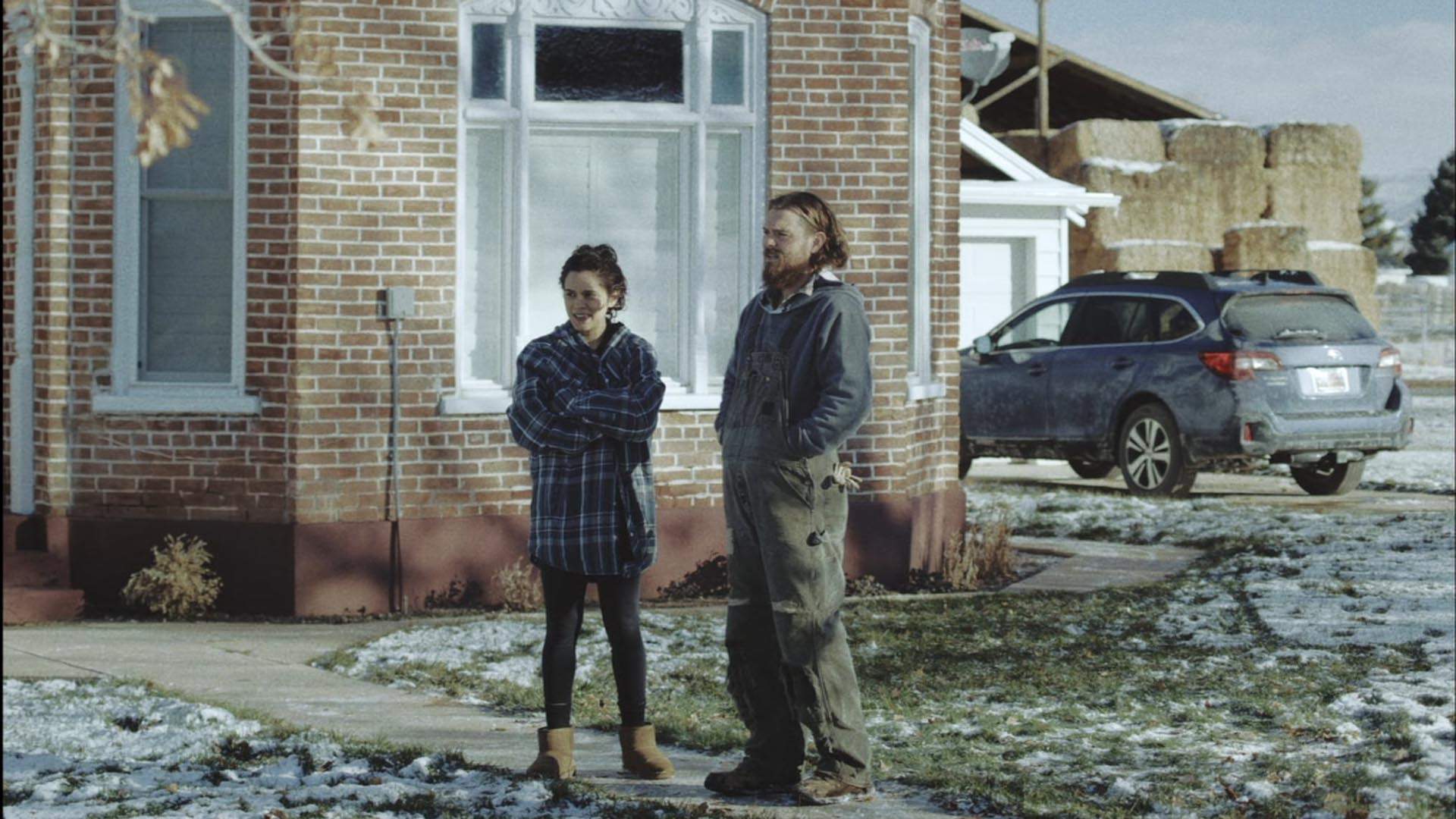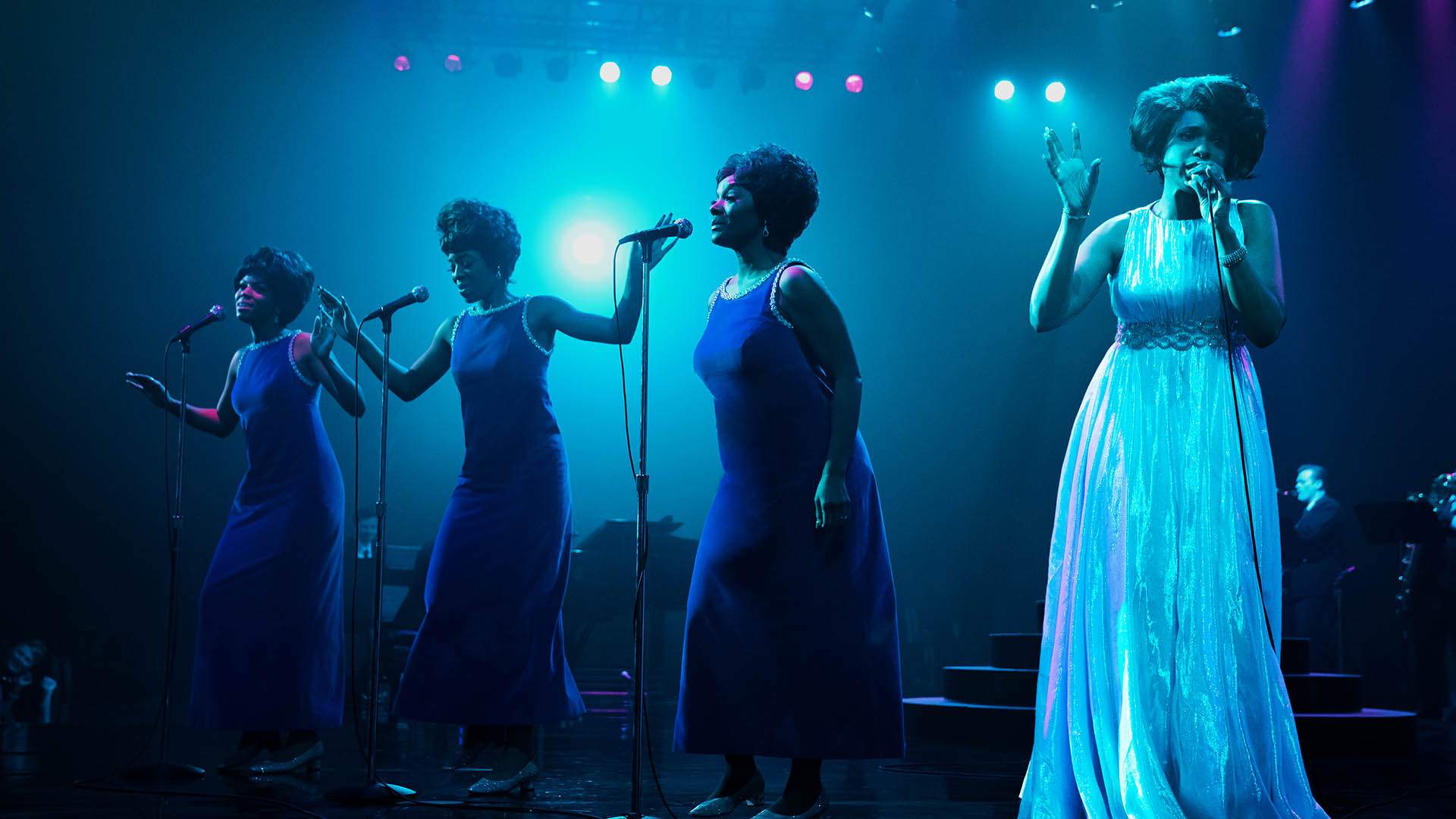The 12 Best New Films You Can Only See on the Big Screen Now That Sydney Cinemas Have Reopened
Sydney's cinemas are back in business, screening everything from must-see horror sequels and superhero blockbusters to insightful documentaries and acerbic comedies.
Something delightful is happening at Sydney's cinemas. After months spent empty, with projectors silent and the smell of popcorn fading, indoor picture palaces have been given the green light to reopen — effective Monday, October 11.
During this year's lengthy COVID-19 lockdown, no one was short on things to watch, of course. In fact, you probably feel like you've streamed every movie ever made this year, including new releases, Studio Ghibli's animated fare and Nicolas Cage-starring flicks. But, even if you've spent all your time of late glued to your small screen, we're betting you just can't wait to soak up the splendour of the bigger version.
Thankfully, plenty of new films are hitting cinemas so that you can do just that — and we've picked the 12 best flicks that you can now head to.
CANDYMAN
Who can take tomorrow and dip it in a dream? 'The Candy Man' can, or so the suitably sugary earworm of a song has crooned since 1971. What scratches at the past, carves open its nightmares and sends them slicing into the present? That'd be the latest Candyman film, a powerful work of clear passion and palpable anger that's crafted with tense, needling thrills and exquisite vision. Echoing Sammy Davis Jr's version of the tune that virtually shares its name across its opening frames, this new dalliance with the titular hook-handed villain both revives the slasher franchise that gave 90s and 00s teen sleepovers an extra tremor — if you didn't stare into the mirror and utter the movie's moniker five times, were you really at a slumber party? — and wrestles vehemently and determinedly with the historic horrors that've long befallen Black Americans. It'll come as zero surprise that Jordan Peele produces and co-penned the screenplay with writer/director Nia DaCosta (Little Woods) and writer/producer Win Rosenfeld (The Twilight Zone). Candyman slides so silkily into Peele's thematic oeuvre alongside Get Out and Us, plus Peele-produced TV series Hunters and Lovecraft Country, that his fingerprints are inescapable. But it's rising star DaCosta who delivers a strikingly alluring, piercingly savage and instantly memorable picture. Alongside bloody altercations and lashings of body horror, razor blade-spiked candy makes multiple appearances, and her film is equally as sharp and enticing.
In a preface that expands the Candyman mythology — and savvily shows how the movie has everyday realities firmly on its mind — that contaminated confectionery is thrust to the fore. In 1977, in the Cabrini-Green housing estate where the series has always loitered, Sherman Fields (Michael Hargrove, Chicago PD) is suspected of handing out the laced lollies to neighbourhood kids. Sent to do laundry in the basement, pre-teen Billy (Rodney L Jones III, Fargo) soon comes face-to-face with the man everyone fears; however, after the boy screams and the police arrive, he witnesses something even more frightening. Jumping to the present (albeit absent any signs of the pandemic given Candyman was initially slated to release in mid-2020), Cabrini-Green is now Chicago's current poster child for gentrification. It's where artist Anthony McCoy (Yahya Abdul-Mateen II, Watchmen) and curator Brianna Cartwright (Teyonah Parris, WandaVision) have just bought an expansive apartment, in fact. They're unaware of the area's background, until Brianna's brother Troy (Nathan Stewart-Jarrett, Generation) and his partner Grady (Kyle Kaminsky, DriverX) start filling them in on the legend that's long been whispered across the local streets — and, struggling to come up with ideas for a new show, Anthony quickly clasps onto all things Candyman for his next big project.
Read our full review.

NITRAM
It's terrifying to contemplate something so gut-wrenchingly abominable as the bodies-in-barrels murders, which director Justin Kurzel and screenwriter Shaun Grant depicted in 2011's Snowtown, and to face the fact that people rather than evil were behind them. Nitram courts and provokes the same response. Exploring the events preceding the Port Arthur massacre, where 35 people were murdered and 23 others wounded in Tasmania in 1996, it focuses on something equally as ghastly, and similarly refuses to see the perpetrator as just a monster or a Hollywood horror movie-style foe. It too is difficult, distressing, disquieting and disturbing, understandably. In their third collaboration — with 2019's bold and blazing True History of the Kelly Gang in the middle — Kurzel and Grant create another tricky masterpiece, in fact. And, the fact that Nitram is about a person is one key reason for its brilliance. The film's core off-screen duo don't excuse their protagonist. They don't to justify the unjustifiable, explain it, exploit it, or provide neat answers to a near-unfathomable crime. Rather, they're exactingly careful in depicting the lone gunman responsible for Australia's worst single-shooter mass killing, right down to refusing to name him. (The movie's title comes from his moniker backwards, and it's all he's ever called on-screen.) Nitram does depict its eponymous figure's mental health issues and medication, and his status as an outcast, but not as reasons for what's to come. It shows his complicated relationships, mentions his struggles as a boy and sees how he's teased as an adult, yet never deems these motives. All such things can be part of someone's life, or not, and that person can commit heinous deeds, or not — and this tremendous feature doesn't ever even dream of seeing that as a straightforward cause-and-effect equation.
In his fifth stint behind the lens — 2015's blistering Macbeth and 2016's abysmal Assassin's Creed are also on his resume — Kurzel does adopt a hazy aesthetic, though. The film isn't dreamy, instead resembling anxious memories worn and frayed from too much time looping in someone's mind. Its imagery is boxed in within a constricted frame, heightening that sensation; however, cinematographer Germain McMicking (Acute Misfortune) shoots Nitram (Caleb Landry Jones, The Outpost) as if he's roving around the space to test the boundaries. The character does just that narrative-wise. He earns his wearied mother's (Judy Davis, Mystery Road) constant exasperation, and almost everyone else's dismay. His father (Anthony LaPaglia, Below) expresses more warmth, but is just as affected. After knocking on her door attempting to start a lawn-mowing business, eccentric lottery heiress Helen (Essie Davis, Babyteeth) shows Nitram kindness and showers him with gifts, but even with her he's still pushing limits. When she sees him shooting at an old car with an air rifle in her sprawling backyard, she forbids it. It's her sternest moment. She also asks him not to lunge at the steering wheel as she's driving and, as turbulent as ever, Nitram keeps doing it. Jones' work here is fragile but weighty, volatile but lived-in, boisterous but anguished, and petulant but intimidating. It's all these things at once and, even with other menacing roles in his on-screen past, it's phenomenal. Every second of his performance, and of Nitram, is a challenge to the views of masculinity that've become as baked into Australia as the ochre-hued soil, too. And, every moment is meticulously crafted to unsettle, to challenge, and to confront the reality that something this abhorrent happened at the hands of one person.
Read our full review.

PIG
Nicolas Cage plays a truffle hunter. That's it, that's the pitch. When securing funding, those six words should've been enough to ensure that Pig made it to cinemas. Or, perhaps another high-concept summary helped. Maybe debut feature writer/director Michael Sarnoski went with these seven words: Nicolas Cage tracks down his stolen pet. Here's a final possibility that could've done the trick, too: Nicolas Cage does a moodier John Wick with a pig. Whichever logline hit the spot, or even if none did, Pig isn't merely the movie these descriptions intimate. It's better. It's weightier. It's exceptional. It always snuffles out its own trail, it takes joy in subverting almost every expectation and savouring the moment, and it constantly unearths surprises. Cage has spent much of his recent on-screen time fighting things — ninja aliens in the terrible Jiu Jitsu and possessed animatronics in the average Willy's Wonderland, for example — in movies that were clearly only made because that was the case. But, when he's at his absolute best, he plays characters whose biggest demons are internal. Here, he broods and soul-searches as a man willing to do whatever it takes to find his beloved porcine pal, punish everyone involved in her kidnapping and come to terms with his longstanding, spirit-crushing woes. Cage's over-the-top turns are entertaining to watch, but this is a measured gem of a portrayal, and a versatile, touching, deeply empathetic and haunting one that's up there with his finest ever.
Sarnoski keeps things sparse when Pig begins; for the poetically shot film and its determined protagonist, less is always more. Rob Feld (Cage) lives a stripped-back existence in a cabin in the woods, with just his cherished truffle pig for company — plus occasional visits from Amir (Alex Wolff, Hereditary), the restaurant supplier who buys the highly sought-after wares Rob and his swine forage for on their walks through the trees. He's taken this life by choice, after the kind of heartbreak that stops him from listening to tapes of the woman he loved. He's found the solace he can in the quiet, the isolation and the unconditional bond with the animal he dotes on. (He's tampered down the full strength of his pain in the process, obviously.) But then, because bad things can happen in cabins in the woods even beyond horror flicks, Rob's pig is abducted in the dark of the night. Now, he's a man on a mission. He has a glare and a stare, too. As the swine's distressed squeals echo in his head, Rob stalks towards Portland to get her back. He has an idea of where to look and who to chase, but he needs Amir to chauffeur him around the city — and Pig is at its finest when its two main characters are together, unpacking what it means to navigate tragedy, fear, loss, regret, uncertainty, an uncaring world and a complicated industry, all in Rob and Amir's own ways.
Read our full review.
NINE DAYS
Androids may dream of electric sheep, or they may not, but that isn't the only metaphysical question that cinema likes to contemplate. Do souls yearn and strive for — and fret and stress over — their chance to shuffle onto this mortal coil? That's the query that Pixar's Soul pondered so thoughtfully and enchantingly, and it's one that Nine Days, which actually predates its animated counterpart but is only reaching Australian cinemas now, masterfully explores as well. "You are being considered for the amazing opportunity of life," a bespectacled, suspender-wearing, serious-faced Will (Winston Duke, Us) tells the candidates hoping to soon live and breathe. They're far more enthusiastic about the process than he is, although he values their prospective existence much more than they can fathom in their wide-eyed eagerness and excitement. Will has seen what can happen next, because it's his job not only to select the best souls to embark upon this thing called life, but to monitor their progress in all the days, months and years afterwards. He's observed the success stories; however, he's also witnessed the heartbreaks as well.
In this stirring and fittingly soulful debut feature from writer/director Edson Oda — a movie that won the dramatic screenwriting award at the 2020 Sundance Film Festival, and that's memorably and evocatively about the texture, experiences, feelings and enigmas that comprise every soul, and every life — Will surveys his next troupe of contenders fresh from viewing the unhappy end that met one of his previous favourites. He's already adrift from existence as we know it, and from almost everyone else who resides in the picture's ethereal yet also earthy pre-life realm, but he's now burdened with a renewed sense of solemnity. His colleague Kyo (Benedict Wong, The Personal History of David Copperfield) tries to get him to see the lighter side — the more human side — of the path his next chosen candidate will take. He emphasises the ebbs and flows that Will, who has become more rigid in his thinking and feelings the longer he's in the role, now fervently discounts. But among a roster of new applicants that includes Kane (Bill Skarsgård, IT Chapter Two), Alex (Tony Hale, Veep), Mike (David Rysdahl, Dead Pigs) and Maria (Arianna Ortiz, Rattlesnake), all of which are given nine days to demonstrate why they should be born next, it's actually the calm, passionate and inquisitive Emma (Zazie Beetz, Atlanta) that challenges the way Will perceives his work and what it means to be alive.
Read our full review.

SHANG-CHI AND THE LEGEND OF THE TEN RINGS
Social media can get you anywhere, or so the story behind Marvel's latest movie and the actor playing its eponymous character demonstrates. Back in 2014, Simu Liu tweeted at the comic book company-turned-filmmaking powerhouse, asking "how about an Asian American hero?". In 2018, after Black Panther's success, he tweeted again — querying "are we gonna talk or what?" with the #ShangChi hashtag. Now, the Kim's Convenience star leads the Marvel Cinematic Universe's 25th feature, and the first to focus on a hero of Asian descent in its 13-year run to-date. He's the face of the franchise's latest step forward, both in terms of inclusion and representation, and in keeping the MCU's ongoing narrative forever hurtling onwards. Liu anchors a film about history and destiny, too — one that's about breaking free from the past and committing to the future — and he heartily embraces the occasion. As directed and co-written by Destin Daniel Cretton (Just Mercy, Short Term 12), Shang-Chi and the Legend of the Ten Rings itself flits between offering up a lively picture that strives to carve out its own space in the series, and simply serving up more of the usual Marvel template but in enticing packaging, however.
Liu first graces the screen as Shaun, a San Francisco valet who's happy parking cars with his best pal Katy (Awkwafina, Breaking News in Yuba County), even though they both know they could follow other paths. While the film shows Katy's family decrying her lack of ambition, Shaun has a keener awareness of what he isn't doing — because he's really Shang-Chi, the son of centuries-old warlord Xu Wenwu (Tony Leung, The Grandmaster), who leads the shadowy Ten Rings criminal organisation and wears the mystical bracelets it's named after. Shang-Chi also has the otherworldly Jiang Li (Fala Chen, The Undoing), the former guardian of an enchanted village filled with dutiful warriors and mythical creatures, for a mother. But when she died when he was a child, his life changed. After the grief-stricken Wenwu obsessively trained him to become an assassin and see vengeance, Shang-Chi fled for the US, where he's lived since. Then, initially via a postcard from his Macau-based, underground fight club-running sister Xu Xialing (debutant Meng'er Zhang), and then thanks a violent visit from his dad's henchmen, he's forced into a family reunion that puts the fate of the universe at stake.
Read our full review.

THE NIGHT HOUSE
The history of cinema is haunted by oh-so-many movies about oh-so-many ghost-riddled abodes, and the often-troubled and bereaved folks dwelling within them. The first clever move The Night House makes is recognising it's floating into busy spectral waters, then ensuring its tension stems from its living, breathing protagonist as much as the frights and fears she's forced to face. The film's second stellar step: casting Rebecca Hall (Godzilla vs Kong) as that central figure. An always-welcome addition to anything she's in — see also: Professor Marston and the Wonder Women, Christine and Tales From the Loop in just the past few years — she plays her tormented part here with brooding sorrow, reluctant vulnerability and a sharp, smart edge. She knows that grappling with loss involves being jolted in many different directions, and being subjected to bumps and jumps of the emotional kind, and that it's never easy to surrender to. Indeed, many of The Night House's surprises come from Hall as Beth, a schoolteacher whose life has been turned upside down by her husband Owen's (Evan Jonigkeit, The Empty Man) unexpected suicide. Clearly normally a no-nonsense type whether she's guiding pupils, dealing with their parents or navigating her personal life, she probes and questions everything that comes her way. As a result, her reactions — including just to herself — are constantly complex, thorny and compelling.
Also among The Night House's savvy moves: understanding that grief really does change everything. Not only has Beth's life lost one of its brightest lights, but everything Owen once illuminated now keeps being cloaked in shadows he's not there to extinguish. Since his passing, she's cycled through the familiar stages of mourning. When she returns to work to her colleagues' astonishment, including her close friend Claire's (Sarah Goldberg, Barry), Beth shocks her co-workers by discussing Owen's suicide note, admitting her home now seems different and obsessing over how much she really knew her husband. That last written missive ties back into one of her past traumas, as well as her own dealings with the end that awaits us all. When she's alone at night, she's not sure that she can trust what she sees and hears, or tell whether she's awake or dreaming. Filling her time by sorting through Owen's things, she's also unsure what to make of the eerie sketches and books about the occult that sit among his possessions. And, Beth's thrown even further askew when she finds photos of brunette women that could be her doppelgängers; plans for a home just like hers, but mirrored; and a cascade of tidbits that cast her memories of her marriage into disarray. The Night House has a strong sense of terror about the the fact that life doesn't extended forever, and it's a movie made with meticulous horror style as well as smarts. When it comes to plot twists, though, director David Bruckner (The Ritual) and screenwriting duo Ben Collins and Luke Piotrowski (Super Dark Times) are less careful about becoming prey to indulgence.
Read our full review.

SHIVA BABY
"What are you up to?". It's a familiar question and, when asked by a friend, it's a considerate and good-natured query that shows their genuine interest. But when it's posed by the wrong person, it comes loaded with expectations and inherent judgement — like the type you might find at a gathering of family members and life-long family pals who've turned their gaze in your direction because you're at the age where interrogating every inch of your existence has become their preferred form of sport. In Shiva Baby, this question comes in multiple ways and is asked multiple times. Attending a shiva, the wake-like mourning ritual observed in the Jewish faith, college senior Danielle (Rachel Sennott, Call Your Mother) is on the receiving end of this barrage. Stuck in a house full of enquiring minds, she feels every needling probe thrust her way by relatives and friends of relatives, all asking about her life, future, job, studies and romantic status, and even her weight. She's trapped in an everyday, immensely relatable situation, of course, but one that's never anything other than awkward — and first-time filmmaker Emma Seligman ensures that her audience feels every second of Danielle's discomfort. (Roving and floating camerawork that gets viewers seeing the chaos from Danielle's perspective, and a score that ramps up the unease — its strings rattling nerves just as effectively as every incident and altercation at the shiva — are some of the director's immersive and well-executed flourishes.)
Danielle doesn't quite know how to answer the onslaught, partly because she doesn't want to and feels as if she shouldn't have to. She's right, obviously. Hours earlier — with the film's blackly comic dramas occurring over a single day — she was happily astride the older, richer Max (Danny Deferrari, Private Life) in a lavish Manhattan apartment. That's how Shiva Baby opens, and he gifts her an expensive bangle afterwards, as well as cash as payment. To her parents and relatives, she refers to her job as "babysitting". The film never intimates that Danielle is ashamed of doing sex work, and refreshingly so, but it gives the impression that she'd prefer not to have a conversation about it with all the busybodies already poking their noses in her direction. Accordingly, she doesn't explain that she missed the funeral because she was having sex. When she arrives at the shiva with her parents Debbie (Polly Draper, Billions) and Joel (Fred Melamed, WandaVision), she has to ask which distant relative died more than once. A recent NYU graduate in her mid-20s, Seligman writes and stages this whole scenario with the specificity of someone who knows the claustrophobia, tension, horrors and social distress these gatherings can inspire, and the cringing that happens deep inside every time. She also knows that there's never just one complication, or even just a couple, as occurs here when Max, his wife Kim (Dianna Agron, Glee) and their baby daughter show up at the shiva, as well does Maya (Molly Gordon, The Broken Hearts Gallery), Danielle's ex-girlfriend from high-school.
Read our full review.

A FIRE INSIDE
Some colours only exist in nature, as much as paints, dyes and pixels attempt to pretend otherwise. The raging reds, blazing oranges and burning yellows seen in A Fire Inside's bushfire footage are some such hues — and, away from the safety of a cinema screen, no one should ever want to spy these specific searing tones. They're haunting enough as it is to look at in a movie. Taking up entire frames of on-the-ground footage shot during the summer of 2019–20, they're scorching in their brightness and intensity. This documentary about the national natural disaster just two years ago, when swathes of Australia burned for months, deploys those apocalyptic colours and the imagery containing them sparingly, notably; however, even when they only flicker briefly, those shades aren't easily forgotten. After everything the pandemic has delivered since the beginning of 2020, just as the 'Black Summer' bushfires were cooling, that chapter of history might seem far longer ago than just a couple of years. A Fire Inside is also an act of remembrance, though. Directors Justin Krook (Machine, I'll Sleep When I'm Dead) and Luke Mazzaferro (a producer on Girls Can't Surf and The Meddler) firmly look backwards, pushing these events back to the top of viewers' memories. That said, they also survey the situation since, as the rebuilding effort has been complicated and elongated by COVID-19 —ensuring that what could've merely been a record of a catastrophe becomes a portrait of both survival and resilience.
Unsurprisingly, interviews drive this Australian doco, focusing on the afflicted and the volunteers. Folks in each group chat about their experiences, and the lines between them frequently blur. Firefighter Nathan Barnden provides the first and clearest instance; the film's key early subject, he saved seven strangers and retained his own life in an inferno on the very first night that the fires reached New South Wales' far south coast, but also lost his cousin and uncle to the blazes the same evening. Barnden claims Krook and Mazzaferro's attention for multiple reasons, including his initial youthful eagerness to pick up a hose — following his father, who had done the same — as well as his candour about his distress in the months and now years afterwards. Often overlooked in tales of such events, that kind of emotion sears itself onto the screen with unshakeable power, too. That's evident in RFS captain Brendan O'Connor's story as well, after he saved his community alongside his crew, but suffered in his personal life. While Krook and Mazzaferro don't loiter on the same kinds of details over and over again, whether they're talking to food bank staff, backpackers helping with re-fencing damaged farms or locals who saw everything they belonged succumb to the flames, the duelling sensations of both endurance and loss remain throughout their doco. The mood: careful, caring, sensitive and poignant. This is a movie that conjures up every sentiment expected, but also one that earns every reaction. Heartbreak and hope seesaw, and recognising that back-and-forth ride is one of the film's canny touches.
Read our full review.

THE KILLING OF TWO LOVERS
If you stare at something long enough, you don't just see the obvious. You notice everything, from the details that fail to immediately catch your attention to the way things can change instantly right in front of your eyes. The Killing of Two Lovers is all about this idea, and on two fronts. It puts a fractured marriage before its lens, ensuring its struggles and troubles can't be ignored. It also takes its time to peer at its protagonist, the separated-and-unhappy-about-it David (Clayne Crawford, Rectify), and at all that his new life now entails. In a sparse small town — with the film shot in Kanosh, Utah — its central figure attempts to adjust to living with his ailing widower father (Bruce Graham, Forty Years From Yesterday). His wife Niki (Sepideh Moafi, The L Word: Generation Q) remains in their home with their four children, as they've agreed while they take a break to work through their problems. David isn't coping, though, a fact that's apparent long before his teenage daughter Jess (Avery Pizzuto, We Fall Down) gets angry because she thinks he isn't fighting hard enough to save their family. He's trying, but as Crawford conveys in a brooding but nervy performance — and as writer/director/editor Robert Machoian (When She Runs) and cinematographer Oscar Ignacio Jiménez (Immanence) can't stop looking at in lengthy and patient takes — he can't quite adapt to the idea of losing everything he knows.
There's an element of Scenes From a Marriage at play here, although The Killing of Two Lovers pre-dates the new remake — and so much of the feeling in this gorgeously shot movie comes from its imagery. When it's hard to look away from such rich and enticing visuals, it's impossible not to spot and soak in everything they depict. Each frame is postcard-perfect, not that those pieces of cardboard ever capture such everyday sights, but wide vistas and the snowy mountains hovering in the background are just the beginning. With its long takes, The Killing of Two Lovers forces its audience to glean the naturalistic lighting that never casts David and Niki's hometown in either a warm glow or grim glower. Repeated images of David alone, especially in his car, also leave a firm impression of a man moving and solo. And, presenting most of its frames in the 4:3 aspect ratio, the film also possesses an astonishing and telling sense of space. Nothing is bluntly boxed in here, but everyone is trying to roam within the claustrophobic patch of turf they've scratched out. And, within the feature's square-shaped visuals springs an added fountain of intimacy that cuts to the heart of such close relationships, such as when David and the kids all pile into his truck, or during one of David and Niki's car-bound dates.
Read our full review.

ROSA'S WEDDING
The idea that a middle-aged woman might put her own interests first shouldn't be worthy of a movie. It should just be a given, as it is with men. But that still isn't the world we live in, so films like Rosa's Wedding keep offering cinematic slices of empowerment — here, in a feel-good, crowd-pleasing, but still smart and enjoyable way. This Spanish two-time Goya Award-winner gets savvy and playful with its title, too. Writer/director Icíar Bollaín (Yuli) and her coscribes Alicia Luna (Viva la vida) and Lina Badenes (also one of the feature's producers) know that mentioning matrimony usually brings a certain kind of rom-com to mind, because countless other flicks have gone down that path. And, there is indeed a ceremony in Rosa's Wedding. An extended family descends upon a scenic spot, relatives fuss and stress, and almost anything that can go wrong does, all in classic wedding movie style. The difference: 45-year-old Rosa (Candela Peña, Kiki, Love to Love), a constantly put-upon seamstress who is taken advantage of at her film industry job, always asked to watch her brother Armando's (Sergi López, Perfumes) young kids, tasked with keeping her widowed dad Antonio (Ramón Barea, Everybody Knows) company, and expected to always be at her daughter Lidia's (Paula Usero, Love in Difficult Times) beck and call, has decided to move back to the coastal town Benicassim that she grew up in to start her own dressmaking business. Also, to cement her commitment to her new future, she's also going to marry herself.
When they receive her wedding invite, Rosa's nearest and dearest are shocked and surprised to learn that she'll be walking down the aisle, but no one registers that she'll be the sole focus of the ceremony. Given how reliant they are on Rosa to run their errands and keep their messy lives in order — Armando is on the verge of divorce, Lidia has two newborns and an unhappy life in Manchester, and Rosa's sister Violeta (Nathalie Posa, Julieta) is an interpreter with a penchant for a drink — they couldn't fathom that she might be unhappy with the status quo anyway. Rosa's Wedding isn't subtle about how women of a certain age are thrust into set roles, even by those closest to them. It isn't big on nuance as it watches its titular figure claim her life back, either. But it's always spirited and astute regardless, not to mention likeable and engaging. And, there's also zero point in holding back when it comes to celebrating women breaking outdated and oppressive boundaries. Also, there's understatement in Peña's wonderful performance. It takes strength and courage for Rosa to first realise how miserable she is, then pledge to make a change, and finally to follow through. As shot in warm, naturalistic tones against its picturesque but never glossy backdrop, Rosa's new future isn't always assured, either, especially when everyone turns up for her big day and brings their baggage with them, and the misunderstandings and chaos only multiplies. 
THE ROSE MAKER
The scent of popcorn lingers in the air, and long-standing venues tend to have a particular aroma, but cinema isn't generally an olfactory medium. Smell-O-Vision pops up every now and then, using scratch-and-sniff cards to emit particular tangs tied to specific films; however, any whiffs tickling your nose while you're watching a movie usually have nothing to do what's on-screen. One of the joys of The Rose Maker is that it makes its audience feel like they're smelling the rows and bouquets of roses they're seeing, even though they obviously can't. Filmmaker Pierre Pinaud (On Air) arranges many of his frames with colourful blossoms, with his array of woody perennials in a rainbow's worth of hues basically becoming flower porn. The more these vibrant sights appear, the more your brain fills in the gaps — but that isn't this kind-hearted comedy's only source of charm. Based on the flicks releasing in Australian cinemas of late, the current state of French cinema is sweet, both scent- and sentiment-wise. Let's call it the fragrant French film universe: the realm in which The Rose Maker, which focuses on growing standout roses, and Perfumes, about a perfume-industry veteran with a particularly fine-tuned sense of smell, can co-exist. The two recent movies don't overlap in their narratives (although a pivotal plot point in the former could easily see one character step right into the latter), but as well as flowers and and scents, they do also share an underlying warmth, an interest in how the senses can bring people together platonically and professionally, and a blend of sincerity and insight layered over otherwise formulaic storylines.
In The Rose Maker, Eve Vernet (Catherine Frot, The Midwife) has devoted her life to creating glorious new rose hybrids — and, ideally for her reputation and her business' bank balance, winning awards for them as well. Her dad did the same, and she's carried on the family trade in the 15 years since his death, even though it's becoming increasingly harder in the face of big, slick outfits that have hundreds of workers, spit out new varieties with frequency and don't care about the longevity of their creations. Indeed, when she's beaten at a prestigious annual rose contest by Lamarzelle (Vincent Dedienne, A Good Man), the owner of one such competitor, Eve fears for her future. Vernet Roses is already struggling financially and can't afford workers, and sales are down. Then her long-standing assistant Véra (Olivia Côte, Antoinette in the Cévennes) comes up with the idea of obtaining help through a rehabilitation program, which sees ex-thief Fred (Manel Foulgoc, Poètes), 50-year-old Samir (Fatsah Bouyahmed, Invisibles) and the highly strung Nadège (Marie Petiot, Hippocrate) begin to learn the rose game. Eve is initially skeptical, but more than roses start blossoming as she enlists her new offsiders' assistance with creating a particular hybrid to win next year's prize. There isn't much in the way of narrative surprises here, but the screenplay co-written by Pinaud, fellow filmmaker Philippe Le Guay (Normandy Nude) and three other scribes smartly uses its familiar plot to interrogate the tiers of French society. And, not only the always-excellent Frot but also relative newcomer Foulgoc turn in textured and moving performances.

RESPECT
When Respect first breaks out its titular track, it's the original Otis Redding version that echoes in the background. The song plays in the Franklin household as Aretha (Jennifer Hudson, Cats) and her family listen, and the scene bubbles with anticipation for the thing everyone watching knows will come. Shortly afterwards, the Queen of Soul tinkers at the piano in the deep of night, her excitement buoyant after hearing her first big hit 'I Never Loved a Man (The Way I Love You)' on the radio. Her sisters Erma (Saycon Sengbloh, Scandal) and Carolyn (Hailey Kilgore, Amazing Stories) join in, and they're all soon rearranging Redding's tune into the single that cements Aretha's status as a music superstar. For the entire film up to this point, viewers have also heard the Franklins, including patriarch and preacher CL (Forest Whitaker, City of Lies), refer to Aretha using a nickname. "Ree" they call her again and again, and soon "ree, ree, ree" is exactly what Erma and Carolyn sing on backing vocals. It's a neat and also exuberant moment. Respect quickly segues to Aretha and her sisters crooning 'Respect' at Madison Square Garden to a rapturous crowd, but watching the track come together has already proven electric. Something can be orderly and expected and potent and rousing all at once, as this movie happily demonstrates regarding its namesake — but for most of its 2.5-hour running time, Respect is content to careen between inescapably formulaic and occasionally powerful.
Respect begins with young Aretha (lively debutant Skye Dakota Turner) being roused from sleep by her father to sing at one of his well-attended house parties. It's 1952, and to an audience that includes Dinah Washington, Duke Ellington and Ella Fitzgerald, she breaks out a rendition of the latter's 'My Baby Likes to Be-Bop' — and "she's 10 but her voice is going on 30" is the shared reaction. This obviously isn't the last time that Aretha unleashes her astonishing voice in Respect, and that everyone in earshot reacts accordingly. When she's accosted by an unnamed man in her bedroom afterwards, it isn't the last time the film veers between highs and lows, either. First-time feature director Liesl Tommy and screenwriter Tracey Scott Wilson (Fosse/Verdon) repeat that pattern, embracing it as comfortably as their key figure croons any song she chooses. But where their subject transcends every ditty she trills, Respect can't be said to do the same. Even viewers unaware of the ups and downs of Aretha's life will still know where each second of the movie is headed. The choice to end with 2016 footage of the real-life singer piping '(You Make Me Feel Like) A Natural Woman' is a classic biopic touch, of course, but it's preceded by far more predictable choices again and again. Hudson shines, and Aretha's music obviously does the same — and yet, although this film has ample respect for the woman at its centre, it also approaches the act of bringing her life to the screen like it's simply taking care of business.
Read our full review.

Sydney cinephiles are currently being spoiled for choice — and while we've outlined the 12 best options above, there are plenty more flicks now gracing the city's silver screens.
Also opening in Sydney cinemas on Monday, October 11 — and also only available to watch in cinemas — are Old, Ride the Eagle, Joe Bell, Don't Breathe 2, Time Is Up and Flashback.
And, a number of movies that've been fast-tracked to digital in recent months are also hitting the big screen in Sydney now that cinemas have reopened. So, you can also head out to see Black Widow, Jungle Cruise, Free Guy, The Suicide Squad, Annette, Space Jam: A New Legacy, Reminiscence and Summer of Soul Summer of Soul (...Or, When the Revolution Could Not Be Televised).
Plus, after showing on Sydney's silver screens for a mere two days before lockdown, In the Heights has returned to cinemas as well.
